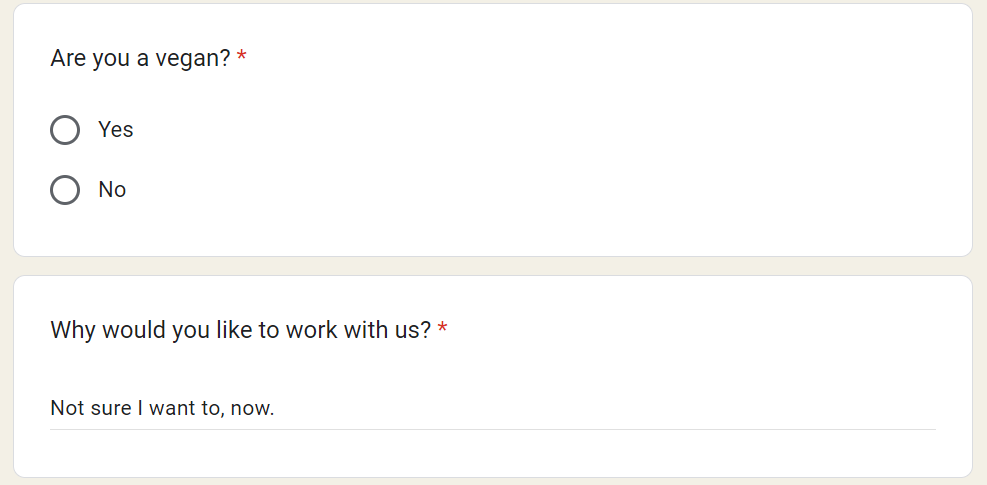Can you screen out job applicants who aren’t vegan?

While mindlessly scrolling through job descriptions to see if any sparked my curiosity (I’m not actively looking, but it’s interesting to see what’s out there), I came across something I hadn’t seen before — a reasonably well-known animal welfare organisation asking in their application form whether candidates were vegan.

It struck me as odd. The recruiter in me thought they were using this question as an easy way to screen people out (link to this). I also thought they might lose too many candidates by making this a simplistic yes/no question. After all, some great candidates might want to be vegan but can’t for whatever reasons, and other people (like me) are too weak-willed to take the next step from vegetarianism, but that doesn’t mean I’m worse at my job than a vegan version of me would be.
Then, the lawyer in me reared his head in—can they even ask this? Short answer: yes! If that surprises you, read on.
Veganism is a Protected Characteristic
The UK’s Equality Act 2010 protects characteristics such as religion or belief from discrimination. Notably, in 2020, the employment tribunal concluded that ethical veganism qualifies as a philosophical belief and thus is protected under the Equality Act. This means ethical vegans are protected from discrimination based on their veganism in employment, education, and providing goods and services (yay!).
Ethical veganism is motivated by concerns about animal rights and welfare, extending beyond diet to avoid all forms of animal exploitation (e.g. horse riding). This goes beyond the more commonly known dietary veganism, which focuses on the health benefits, or environmental veganism, which aims to reduce the environmental impact of animal agriculture by avoiding animal products. Of course, these things aren’t mutually exclusive, but it is essential to distinguish them for the sake of this post.
Given ethical veganism is a protected characteristic, can employers use it when recruiting for roles? At the end of the day, all recruitment is discrimination in the purest sense of the word. You're trying to sort the goats from the sheep. Can we discriminate based on whether some goats have a particular ethical stance? 🐐
Genuine Occupational Requirement
Let's take two roles: Campaigns & Engagement Manager and Bookkeeper. The former leads the organisation’s corporate and campaign efforts to secure cage-free policies from food companies, and the latter manages and records the organisation’s financial transactions.
Do the requirements to perform well in one of these jobs require that the candidate be a vegan? I'd argue that for the Bookkeeper role, the answer is unequivocally ‘no’, with a caveat that maybe a non-vegan in that role won't succeed because they won't fit with the broader organisational culture (although another way of putting that is that colleagues will be intolerant towards the person, which brings a different host of issues).
Because the Campaigns & Engagement Manager is a public-facing role where persuasion plays a key part, there's a robust argument that being vegan is necessary. A non-vegan in the role might lack the moral authority to advocate for cage-free policies, being on the back foot at every turn, which would take a toll on their performance.
So ask yourself: can I make a defensible argument that not being vegan would hinder the candidate’s performance, such that being vegan is a genuine occupational requirement of the role? This is why women's shelters can select female support workers and discriminate against male candidates. It's reasonable that certain niche jobs require a specific profile. For another explanation about this, check out Acas.
Let them eat (gay) cake
What if you were gung-ho and didn't care about staying within the genuine occupational requirement framework I outlined above? What if you wanted your Bookkeeper to be vegan as well because you crave those cult-y vibes? If you're in the UK, you might be in luck.
We had our own gay cake case in 2018—Lee v Ashers Baking Company Limited. The Supreme Court decided that a bakery did not discriminate against a customer by refusing to make a cake with a message supporting gay marriage because the bakery's refusal was based on the message itself, not on the customer's sexual orientation. The court emphasised that the law protects individuals from being treated unfairly due to their own characteristics, not the beliefs of the business owners.
The Employment Tribunal, in the 2020 case I linked above, applied this principle to conclude that discrimination claims should focus on the protected characteristics of the person alleging discrimination, not those of the discriminator.
In our case, candidates are not being discriminated against because of something they have but because of something the potential employer has. Candidates might be able to claim discrimination if they also had a protected characteristic, but following a meat-eating or vegetarian diet hasn't and likely won't be upheld as a protected characteristic. One important exception that I won't go into is if someone can't be a vegan because of a disability.
Bring on the vegans
So all in all, while it might seem a bit on the nose to actively screen out job applicants based on whether they’re vegan, and while that might land you in some hot water in the court of public opinion, it seems that (at least in the UK) it’s a reasonably safe stance to take. Personally, I would still only do so for roles where there’s a defensible genuine occupational requirement that passes a common sense test, not only because it’s a legally well-grounded path but also because having a work culture where only a specific type of person is accepted sounds a bit on the toxic side to me.